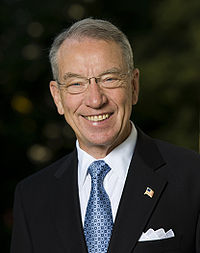
The gentleman to your left seems not to like his job much at all. Maybe we should help him find a new one.
As the Senate Finance Committee debated the Public Option‘s inclusion in the Health Care Reform Bill yesterday, this line caught me in a WTF? moment to remember. “Government is not a fair competitor,” Republican Senator Charles Grassley of Iowa said. “It’s a predator.”
Did Mr. Grassley just call himself a predator? I mean, this is a Predator. Clearly, Chuck has quite negative views on what government is. Why would somebody want to work in the government holding those views? And why would the people of Iowa vote for someone who would say such a thing? Sort of like supporting an arsonist to become Chief of the Fire Department, don’t you think?
By the way the Public Option, which would simply give everyone more choice in health care coverage, is far from dead. The House Health Care Bill
is pretty sure to have it included, and public opinion is still very
much for a public option (you know, like almost every other country in
the industrialized world has). But I don’t think we’ll make much
progress until we get deeper at this strange wrong view that Government
is Bad. Government is Us, Mr. Grassley. You and me. Nothing more or
less. I am not a predator, sir. Nor are the people of Iowa who elected
you.
 Check out this interesting website: Government is Good.
Check out this interesting website: Government is Good.
Government is basically good, when held accountable. In democracy,
Government is interdependent citizens deciding what to do together. Why
does Chuck Grassley hate his job so much? And if he does, shouldn’t the
people of Iowa interdependently decide to be governed by someone
who…you know…likes government? Or could he at least give up his
insurance which he gets from the…um…government (!), and see how 50
million Americans live, needlessly?
Government is basically good, and basically us. Until we start electing people who understand that, we aren’t going to make much progress understanding interdependence.

